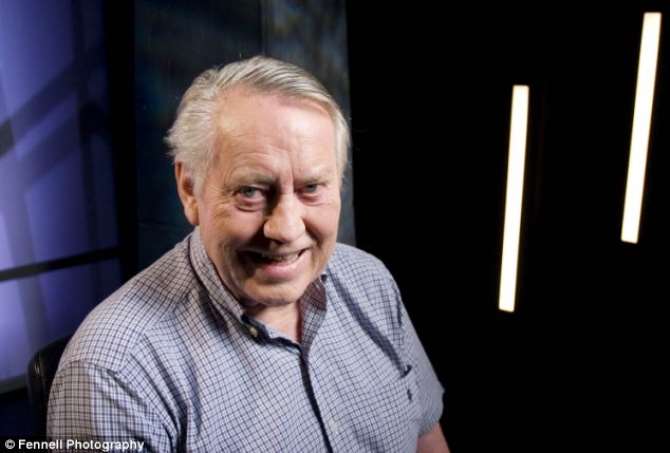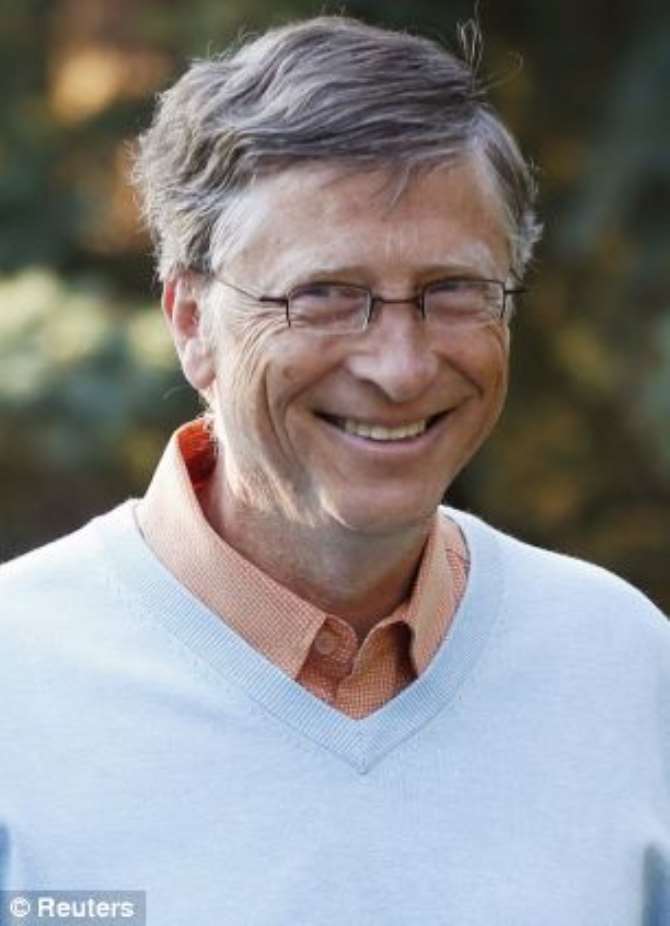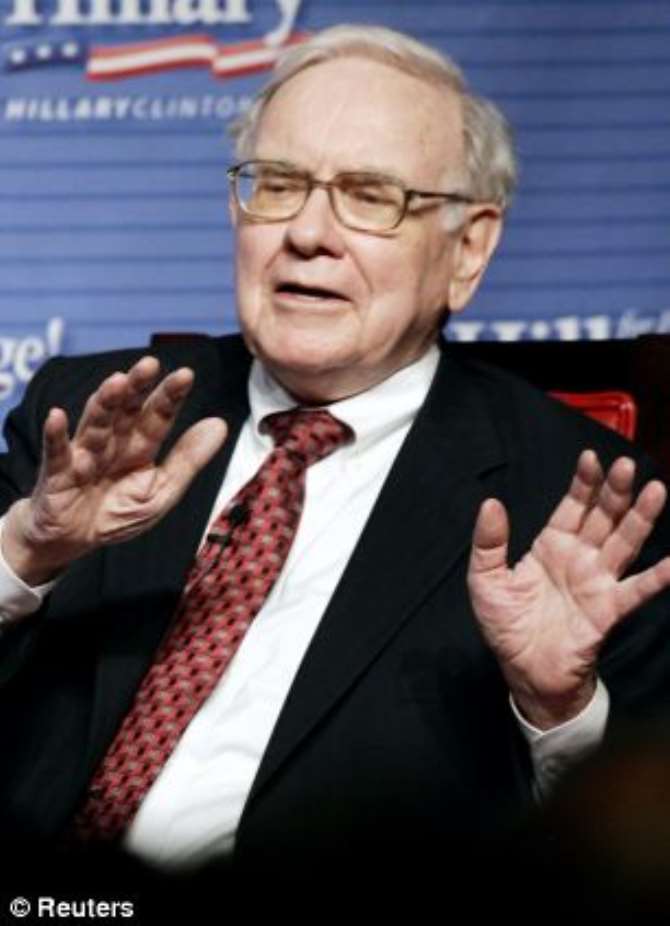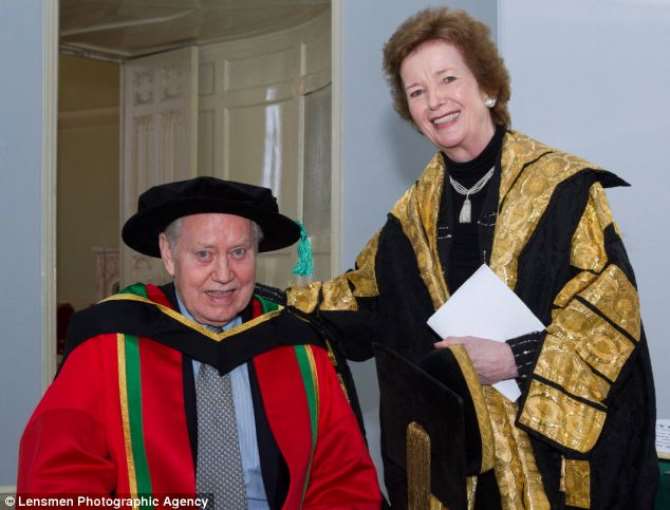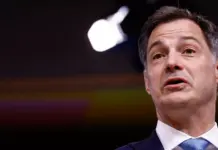- Philanthropist Chuck Feeney made his fortune in a duty free company
- He began giving his money away in secret in 1984 and was outed in 1997
- His Atlantic Philanthropies foundation will give away its money by 2020
An Irish-American billionaire who kept his philanthropy secret for 15 years has given away $7.5billion (£4.9billion) – and plans for it all to go to charity before his dies.
Chuck Feeney, 82, wears a $15 Casio watch, travels in coach, does not own a car is a self-confessed ‘shabby dresser’ and sensibly made his children work their way through college.
He has given away 99 per cent of his fortune to health, science, education and civil rights causes around the world through his Atlantic Philanthropies foundation.
Feeney, who still has a sizeable $2million left in the bank, made his money from duty free shopping and quietly began giving his money away in the 1980s.
Chuck Feeney, an 82-year-old billionaire, has given away 99 per cent of his fortune over the past three decades
His generosity went unknown until 1997 and he even made charities keep the source of their donations secret because he did not want the attention.
Feeney’s ‘giving while living’ philosophy inspired Bill and Melinda Gates to set up their charitable foundation as well as Warren Buffet’s Giving Pledge, where some of the richest people in the world have promised to give away half of their fortune during their lifetime.
The fund has handed out $6.2billion in three decades and will close in 2020 once its last good causes have been chosen.
‘People who have money have an obligation,’ Feeney told Forbes last year. ‘I wouldn’t say I’m entitled to tell them what to do with it but to use it wisely.’
Feeney, who was raised by Catholic parents in an Irish-American New Jersey neighbourhood during the Depression, preferred to use his influence and connections during his lifetime rather than letting his money be frittered away after his death.
‘I became convinced that there was greater satisfaction from giving my money away and seeing something come out of the ground, like a hospital or a university,’ he told the Financial Times last year.
‘It just seemed logical to put the money to good use rather than putting it into a bank account and letting it accumulate and accumulate.’
He told Forbes: ‘I concluded that if you hung on to a piece of the action for yourself you’d always be worrying about that piece. People used to ask me how I got my jollies, and I guess I’m happy when what I’m doing is helping people and unhappy when what I’m doing isn’t helping people.’
Feeney inspired the philanthropy of Microsoft founder Bill Gates, left, and billionaire Warren Buffet, right
Feeney served as a radio operator in the United States Air Force and won a G.I. scholarship to Cornell University.
He has remembered his roots by giving $1billion to education in Ireland, which mainly went to universities, and $950million to his Ivy League alma mater.
Ireland’s universities, including those in Northern Ireland, awarded him an unprecedented joint honorary degree last year to thank him for his help.
The University of Limerick alone received $170million.
His efforts in Ireland extended to quietly funding the peace process, something he also did in apartheid-era South Africa.
Feeney disagreed with America’s war in Vietnam, so has given $350million to the country for healthcare and higher education.
Operation Smile, a project to treat children born with cleft palates, has had $19.5million from Atlantic, while cancer projects have had $370million.
Mr Feeney pictured receiving an honorary doctorate from Mary Robinson, the Chancellor of the University of Dublin last year. Ireland’s universities award him a joint honorary degree to thank him for investing $1billion in the country’s education system
AIDS research in South Africa has had $117million in investments from the foundation.
He has given $28million to support the abolition of the death penalty in the United States and has campaigned for eight million children in the country without health insurance to be covered.
Feeney’s children worked as maids, waiters and cashiers throughout college but shared $140million of the money from his company Duty Free Shoppers, so have certainly not been cut adrift.
His 38.75 per cent of the company was signed over to his foundation in 1984, a time when rich lists were hailing him as one of America’s richest men, not knowing the money was no longer his.
However, Feeney avoided as much tax as possible during his career, setting up companies in tax havens under the name of his French first wife, Danielle.
When challenged by the FT to say if it was hypocritical for a tax dodger to become a philanthropist, he retorted: ‘I bet it is the government saying that’.
His intention is for all of his money to be gone by the times he goes.
He told the New York Times : ‘I want the last check I write to bounce’.
google.com, pub-6336011652228911, DIRECT, f08c47fec0942fa0
